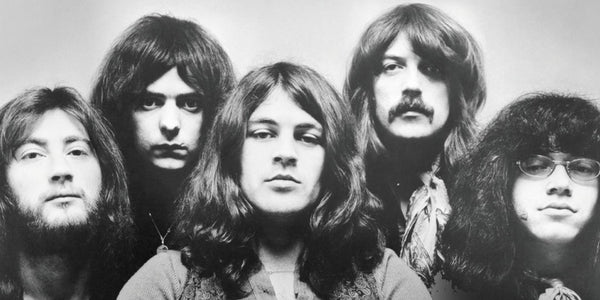Unquestionably one of the most influential, commercially-successful and revered of British Hard Rock bands, Deep Purple rose to prominence in the late sixties and early seventies, and, alongside fellow Brits Led Zeppelin and Black Sabbath, formed an ‘Unholy Trinity’ that achieved a Global dominance over the music marketplace at the time. The band cemented their status through the time-honoured method of hard touring, being a stellar combo onstage, and having the knack to compose memorable, well-constructed and punchy hard rock anthems that have become classics of the genre. Great on record, even better live.
The incredible late sixties success of Cream in the USA, which was achieved through gruelling, remorseless touring, taking their potent live act into the heartlands of the country away from the music business capitals of New York and Los Angeles, set a benchmark for the Brit bands that followed in their wake. The frontiersman spirit of the Cream tours very quickly gave way to a more sophisticated touring regimen – their successors took note of How It Was Done, as well as where the band made mistakes. Factor in the technological advances in PA systems, onstage monitors, enhanced and innovative lighting rigs – the actual ‘show’ side of touring became more advanced – and there was a method there that could reach rich rewards, providing you were willing to put in the Hard Yards.
The emergence of hard rock bands was reflected in seismic shifts in the corporate structure of the mainstream music business of the time. Where previously it was really a singles-orientated market, by the late sixties the emphasis had changed to the long-playing album as the format in which bands could best express their creativity. By the early seventies, some bands had pretty much abandoned the seven-inch vinyl medium – Led Zeppelin famously said that they would no longer release singles. The promotion and marketing of this new music became more directed, with a particular focus on the album buyer.
There was a growing schism which classed the singles charts in the USA and UK as the home of ‘pop’, and the album charts as the home of ‘rock’ (although not necessarily exclusively so – Deep Purple and Black Sabbath had notable UK singles chart hits in the early seventies). As bands such as Led Zeppelin and Deep Purple embraced the album format as a place where they could expand the envelope of what they could do, in the USA FM radio underwent a massive expansion, with presenters and producers even playing whole albums by bands as opposed to a single track. And in Britain, the National Pop station, BBC Radio 1, was forced to look two ways at once – daytime programming was singles/ pop orientated, with evening shows being devoted to the Hard Rock/ Progressive music of the time.
Given this confluence of factors, things were well set up for Deep Purple to not only make their commercial breakthrough but also to thrive. Most hard rock fans in general and Deep Purple fans in particular remember the ‘classic’ line-up of Ian Gillan (vocals), Ritchie Blackmore (lead guitar), Jon Lord (keyboards), Roger Glover (bass) and Ian Paice (drums) as the bands’ high watermark, with the mega-selling Machine Head as perhaps their defining long player, although In Rock and Fireball are similarly revered. Deep Purple had a musical pedigree that seemed to guarantee success. The individual members had all paid their dues – Blackmore through his session work with the likes of Joe Meek productions as a member The Outlaws, backing Gene Vincent on a UK tour, as well as Neil Christian’s Crusaders, Lord had been in The Artwoods, as well as being in the opportunistic Flowerpot Men, Gillan and Glover had been in Episode Six, and Paice had been in the band Maze, alongside original Purple vocalist Rod Evans.
The provenance of the band, who also had strong management and record company support proved to be a magnificent live attraction. The awesome interplay between Blackmore’s sizzling lead guitar and Lord’s equally articulate Hammond organ work, held down by the crunching Glover/ Paice rhythm section, and with Gillan’s intense lead vocals made for an irresistible combination. Their live set could oscillate between heads down raunchy rockers like ‘Speed King’ and ‘Fireball’ through to the sepulchral ‘Child In Time’, and thoroughly deserve their place in the aforementioned Brit Rock Unholy Trinity.
Of course, the problem with keeping what became a Hard Rock juggernaut together was balancing the various forces at work. Egos, the relentless pressure of touring, writing and recording, and individuals wanting to assert their authority meant that the centre could not hold. Whereas a band like Led Zeppelin seemed to share something of a manifest destiny, and the individuals always asserted that the whole of Led Zeppelin was much greater than the sum of its parts, the internal strife that caused the ‘classic’ Purple line up to splinter at times resembled a hard rocking soap opera.
Subsequent line-up changes did bring renewed focus – and there are many long-term Purple fans who will make a case for the David Coverdale/ Glenn Hughes era of the band, and the brief recruitment of the ill-starred but richly talented guitarist Tommy Bolin – the band would eventually split in 1976. They have since reformed numerous times, but the induction of guitarist Steve Morse in 1994 seemed to reinvigorate the Purple collective – then comprising Gillan, Glover, Paice and Lord – and the band soldiered on. Lord would die of cancer on 16th July 2012, aged seventy-one, and his role in the band is currently filled by Don Airey. They released their first album comprising entirely of covers, Turning To Crime, in November 2021, and there is no sign of the band wanting to throw in the towel over fifty years after their inception.
With thanks to Alan Robinson
